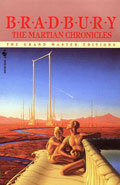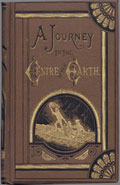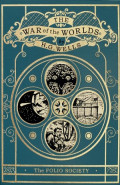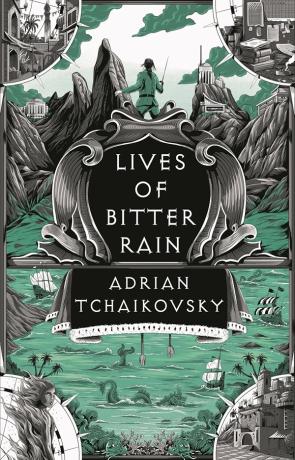Top 5 Must Read Vintage Sci-Fi Novels
Although some people consider science fiction novels to be a literary realm where only nerds dare to tread, savvy readers realize that there is more to this genre than spaceships and robots. Set amid the trappings of futuristic technology and otherworldly locales, science fiction has the power to raise thematic questions about very human issues, such as race, foreign policy, ethics, and human rights, through the fantastic filter of the future.The following vintage science fiction novels were ahead of their time, but not for the reasons you might expect.
The Martian Chronicles (1950) by Ray Bradbury
 Despite the title and the subject matter, The Martian Chronicles by Ray Bradbury is not really about Mars. Bradbury is less concerned with the logistics of the journey to Mars, like how the astronauts breathe or what technology they use, than he is with the implications presented by colonizing an already inhabited planet. When humans arrive on a planet already cultivated by the complex and mysterious Martian civilization, their interactions mirror those of early settlers coming to the Americas. Themes of immigration, colonization and war run throughout this poetic novel presented as a collection of short stories starring the romance between the third planet and its nearest planetary neighbor.
Despite the title and the subject matter, The Martian Chronicles by Ray Bradbury is not really about Mars. Bradbury is less concerned with the logistics of the journey to Mars, like how the astronauts breathe or what technology they use, than he is with the implications presented by colonizing an already inhabited planet. When humans arrive on a planet already cultivated by the complex and mysterious Martian civilization, their interactions mirror those of early settlers coming to the Americas. Themes of immigration, colonization and war run throughout this poetic novel presented as a collection of short stories starring the romance between the third planet and its nearest planetary neighbor.
A Journey to the Center of the Earth (1864) by Jules Verne
 In this lesser known Jules Verne gem, a driven scientist and his cowardly nephew follow a medieval map into a crater that leads them to a dangerous and fantastic subterranean world. Verne took his scientific inspiration from geological texts of the time that were some of the earliest representations of the origins of man. In many ways, this inventive novel was ahead of its time, exploring geological, environmental, and anthropological concepts that were cutting edge when it was written. That having been said, some of the passages tend to be densely scientific, discussing concerns about the interior of the earth and environmental concerns. Even though it was written in the mid-nineteenth century, Verne's ideas are largely consistent with modern day environmental concerns. When you consider the lengths energy companies still have to go to today today, vying to offer affordable, cleaner energy to the general public, consider how reluctant the public must've been to embrace Verne's ideas 151 years ago. In addition, Verne explores prehistoric creatures and literal cave people, displaying the impatience of ambition and the limits of hubris as the main character continues to challenge life threatening circumstances in the name of science.
In this lesser known Jules Verne gem, a driven scientist and his cowardly nephew follow a medieval map into a crater that leads them to a dangerous and fantastic subterranean world. Verne took his scientific inspiration from geological texts of the time that were some of the earliest representations of the origins of man. In many ways, this inventive novel was ahead of its time, exploring geological, environmental, and anthropological concepts that were cutting edge when it was written. That having been said, some of the passages tend to be densely scientific, discussing concerns about the interior of the earth and environmental concerns. Even though it was written in the mid-nineteenth century, Verne's ideas are largely consistent with modern day environmental concerns. When you consider the lengths energy companies still have to go to today today, vying to offer affordable, cleaner energy to the general public, consider how reluctant the public must've been to embrace Verne's ideas 151 years ago. In addition, Verne explores prehistoric creatures and literal cave people, displaying the impatience of ambition and the limits of hubris as the main character continues to challenge life threatening circumstances in the name of science.
Foundation (1951) by Isaac Asimov
 The Foundation Trilogy, as Asimov's famous series of short stories came to be known, focuses on the complex themes that surround the building of a new empire. It takes place in a future where a highly specialized branch of mathematics allows a mathematician, Hari Seldon, to predict the future in broad strokes. Faced with two potential futures, one infinitely more favorable for the entire galaxy, Seldon sets about the monumental task of laying the foundations for a new galactic empire that will seal the fate of the Milky Way. The galactic implications in the book are based on the principles explored in Edward Gibbon's History of the Decline and Fall of the Roman Empire.
The Foundation Trilogy, as Asimov's famous series of short stories came to be known, focuses on the complex themes that surround the building of a new empire. It takes place in a future where a highly specialized branch of mathematics allows a mathematician, Hari Seldon, to predict the future in broad strokes. Faced with two potential futures, one infinitely more favorable for the entire galaxy, Seldon sets about the monumental task of laying the foundations for a new galactic empire that will seal the fate of the Milky Way. The galactic implications in the book are based on the principles explored in Edward Gibbon's History of the Decline and Fall of the Roman Empire.
The War of the Worlds (1898) by H.G. Wells
 The War of the Worlds is a unique and futuristic novel, and not just because it features extraterrestrials and advanced spacecraft. The premise of this novel unites all of humankind on the losing end of a war when Martians invade the planet, intent on stealing Earth's natural resources. While this may seem a little unfair and one sided, it's only what humans have been doing to each other for centuries, as the unusual narrator of this grim story is quick to point out.
The War of the Worlds is a unique and futuristic novel, and not just because it features extraterrestrials and advanced spacecraft. The premise of this novel unites all of humankind on the losing end of a war when Martians invade the planet, intent on stealing Earth's natural resources. While this may seem a little unfair and one sided, it's only what humans have been doing to each other for centuries, as the unusual narrator of this grim story is quick to point out.
1984 (1949) by George Orwell
 While many of the books in this list feature more flamboyant aspects of the genre like space travel and artificial intelligence, 1984 by George Orwell uses its bleak futuristic vision to hit home. In the grim dystopian future 1984 of the novel, the totalitarian government uses video cameras, hidden microphones and other monitoring technology to completely control the population. The main character of this striking and satirical novel works for a government agent as an editor of history, literally rewriting events in a government sanctioned effort to control all thought. The heavy hitting social concepts outlined in this novel make it one of the most important works of fiction written in the 20th century.
While many of the books in this list feature more flamboyant aspects of the genre like space travel and artificial intelligence, 1984 by George Orwell uses its bleak futuristic vision to hit home. In the grim dystopian future 1984 of the novel, the totalitarian government uses video cameras, hidden microphones and other monitoring technology to completely control the population. The main character of this striking and satirical novel works for a government agent as an editor of history, literally rewriting events in a government sanctioned effort to control all thought. The heavy hitting social concepts outlined in this novel make it one of the most important works of fiction written in the 20th century.
News Archives
- August 2024
- July 2023
- April 2023
- February 2023
- September 2022
- March 2022
- February 2022
- July 2021
- June 2021
- April 2021
- March 2021
- January 2021
- October 2020
- September 2020
- June 2020
- March 2020
- May 2019
- January 2019
- November 2018
- January 2016
- September 2015
- August 2015
- July 2015
- June 2015
- May 2015
- April 2015
- March 2015
- January 2015
- October 2014
- June 2014
- April 2014
- March 2014
- February 2014
- January 2014
- December 2013
- November 2013
- October 2013
- September 2013
- June 2013
- May 2013
- April 2013
- March 2013
- January 2013
- December 2012
- November 2012
- August 2012
- July 2012
- June 2012
- May 2012
- April 2012
- March 2012
- February 2012
- January 2012
- December 2011
- November 2011
- October 2011
- September 2011
- August 2011
- July 2011
- June 2011
- May 2011
- April 2011
- March 2011
- February 2011
- January 2011
- December 2010
- November 2010
- October 2010
- September 2010
- August 2010
- July 2010
- June 2010
- May 2010
- April 2010
- March 2010
- February 2010
- January 2010
- December 2009
- November 2009
- October 2009
- September 2009
- August 2009
- July 2009
- June 2009
- May 2009
- April 2009
- March 2009
- February 2009
- January 2009
- December 2008
- November 2008
- October 2008
- September 2008
